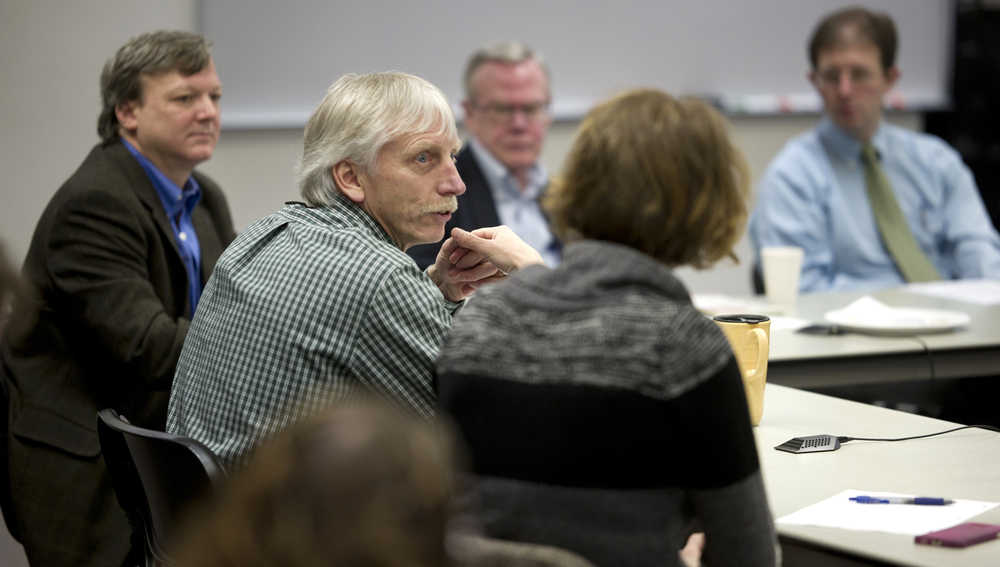The pastries were sweet, the news was not.
On Tuesday, the City and Borough of Juneau Assembly hosted its federal lobbyist, state lobbyist and two members of Juneau’s delegation to the Legislature for a breakfast briefing about the capital’s interests in the state and federal capitols.
“It’s going to be a really tough session this year,” Sen. Dennis Egan, D-Juneau, told the Assembly.
While state lawmakers are considering budget cuts and tax increases to balance a $3.5 billion deficit, Egan warned that it may not be possible for Southeast lawmakers to shield the region from impacts.
Last week, the Alaska Department of Labor published a forecast speculating that Southeast Alaska could lose 350 state government jobs this year.
“We’re becoming rural Alaska,” he said, speaking about the decline of Southeast’s influence in the Legislature.
In the redistricting that followed the 2010 U.S. Census, Southeast Alaska lost a Senate seat and a House seat as its population plateaued while Southcentral’s surged. With fewer seats in the Legislature comes less influence. Making matters worse from Southeast’s perspective, the redrawn districts coincided with a Republican surge in the Legislature that erased a bipartisan majority in which Southeast lawmakers held significant influence.
Among Juneau’s three-person delegation, only Rep. Cathy Muñoz, R-Juneau, remains in the majority, but even she thinks lawmakers are in for rough sailing.
“I think it’s going to be one of the toughest sessions we’ve seen in our time, and maybe of all time,” she told the Assembly.
Egan said he favors a state income tax rather than a statewide sales tax as one route to a balanced budget. With Juneau already collecting a sales tax, adding a statewide sales tax has the potential to affect local government.
Muñoz said she believes “a good chunk of the solution lies in the earnings reserve” of the Alaska Permanent Fund.
Kevin Jardell, the CBJ’s lobbyist in the Alaska Capitol, said residents should expect further cuts to the Alaska Marine Highway System and no money for construction projects.
“I do not expect us to get any capital funding this year for projects that are discretionary,” he said, speaking specifically to the Assembly’s request for money for a way to get rid of the produce from the city’s wastewater treatment plants.
On non-budget items, Muñoz said she’s optimistic about a compromise proposal for the Daylight Saving Time issue. If Railbelt legislators are interested in getting rid of the annual time switch, Southeast lawmakers are proposing a move to Pacific Time as a precondition, effectively making Daylight Saving Time permanent in Alaska.
Arriving from Washington, D.C., city lobbyist Katie Kachel said there’s “good news and bad news.”
Federal lawmakers agreed on a five-year transportation funding bill and a national budget good through October, but “by clearing the decks of important legislation, there’s not much leverage left to get things done.”
Among the few critical items remaining on Congress’ agenda before this year’s election is a March reauthorization of the FAA, which operates the federal air transportation system.
As lawmakers arrive from the rest of Alaska, the Assembly and the Alaska Committee will host the 31st annual Legislative Reception at 5 p.m. Jan. 20 in Centennial Hall.

